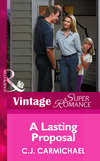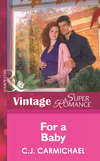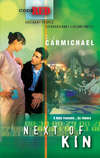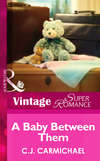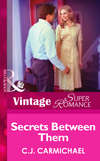Kitabı oku: «A Lasting Proposal»
“What’s got you all worked up?” Jake asked
He rested a hand on her shoulder as though that was the most natural thing in the world for him to do.
“You’ve never had sisters,” Maureen replied. “So you wouldn’t understand.”
“You were talking about trust—I know that. You were wondering how Cathleen could’ve trusted Dylan so much that she always believed in him—always believed he didn’t commit that murder.”
“Yes. So?”
“Well, it’s got me thinking that’s our problem, too. I hurt you and broke your trust. Now I need to earn it back again.”
“That’s one way to look at it, “she agreed. “Or we could just count our losses and move on.”
“But how would that get us any further ahead? Maureen, no matter who you end up with, eventually, at some point, he’s going to let you down. The right person, though, will try to make up for it when he’s made a mistake.”
The right person. Was it really as simple as that? And if it was, how was a woman supposed to know when she’d found him?
Dear Reader,
As I contemplate this last book of my trilogy, I remember how daunted I felt when I began to write it. My first obstacle related to the murders of Jilly Beckett and Rose Strongman, which occurred in A Second-Chance Proposal. I’d come to realize that the person I’d thought responsible really wasn’t. My readers deserved the truth…but what was the truth?
Next, I worried about Maureen, the firstborn of the Shannon sisters. With this character I knew I’d be addressing deeply emotional issues. Her sisters had always seen her as forceful and confident, but Maureen was plagued with insecurities about her failed first marriage and the strained relationship she had with her twelve-year-old daughter, Holly. I wanted Maureen to find peace and happiness in a new relationship with a special man. But the hero I’d selected—Jake Hartman—balked at just the wrong moment. For a while I feared all was lost.
I sat in front of my computer day after day, writing paragraphs, only to delete them an hour later. Less than three weeks remained before the deadline when insight struck. Suddenly, I knew whodunit and why. And that Jake really was the right man, the lasting man, for Maureen. From that point on, writing the book became joyful and very satisfying. I hope you’ll experience those same emotions as you settle in to visit with the Shannon sisters one last time.
Sincerely,
C.J. Carmichael
P.S. I’d love to hear from you! My mailing address is 1754-246 Stewart Green, S.W., Calgary, Alberta T3H 3C8. Please send an e-mail to: cjcarmichael@shaw.ca and by all means visit me at www.cjcarmichael.com.
A Lasting Proposal
C.J. Carmichael
This trilogy is dedicated to my editors,
Beverley Sotolov and Paula Eykelhof,
with my thanks and affection.
Thanks to those who assisted me in my research, in particular, Corporal Patrick Webb of the RCMP in Calgary, Constable Barry Beales of the RCMP Canmore Detachment and Lynn Martel, a reporter with the Canmore Leader.
CONTENTS
PROLOGUE
CHAPTER ONE
CHAPTER TWO
CHAPTER THREE
CHAPTER FOUR
CHAPTER FIVE
CHAPTER SIX
CHAPTER SEVEN
CHAPTER EIGHT
CHAPTER NINE
CHAPTER TEN
CHAPTER ELEVEN
CHAPTER TWELVE
CHAPTER THIRTEEN
CHAPTER FOURTEEN
CHAPTER FIFTEEN
CHAPTER SIXTEEN
CHAPTER SEVENTEEN
CHAPTER EIGHTEEN
CHAPTER NINETEEN
PROLOGUE
Fall, 1999
IT WAS A NIGHT OF ORANGES, golds and blood, blood red. The sun had not quite set on the Thunder Bar M ranch outside Canmore, Alberta. Yet already clinging to the foothills on the eastern horizon was the harvest moon, heavy and florid. Aspens, dripping in their amber foliage, framed the old log ranch house. At the center of it all raged a bonfire. Prongs of orange flames and spears of thick, black smoke lashed out at the darkening sky.
Two groups, mostly men, stood on opposite sides of the blaze. The oilmen versus the ranchers—a centuries’ old animosity.
Max Strongman knew that the men on the other side of the fire saw him as a sellout. He was married to the woman who owned this land. Today he hoped to finalize a deal on her behalf with Beckett Oil and Gas to explore, develop and produce the black gold upon which the wealth of Alberta was based. The CEO of the company, Conrad Beckett, stood beside him with his teenage daughter, Jilly.
There were others. Max’s grown son, James. Harvey Tomchuk, Max’s retirement-age accountant. Several executives from the oil company, too, as well as lawyers and investment representatives from the nearby city of Calgary.
A deal was imminent, despite Beckett’s unexpected posturing as they’d discussed terms a few hours earlier. Max hoped that good food and plenty of expensive wine would nudge the executive in the right direction. Inside the ranch house, his wife and the caterer had huge beef ribs marinating in a smoky-red barbeque sauce, next to salads, breads and more. When the fire died down a little, he would start cooking.
Or so he’d planned. But fifteen minutes ago a gang of men had marched up the lane from the public access road. His wife’s son, Dylan McLean, a dark-haired, fiery-tempered man with strong opinions on the heritage of the land his great-grandfather had homesteaded, led the entourage. With Dylan was his cousin, Jake Hartman, a towering blond mountaineer. They were at the forefront of the group of neighboring ranchers and local environmentalists who opposed the deal Max had worked out with Beckett.
This problem Max didn’t need right now. The deal just had to go through! He’d staked his future and his son’s on this land. Together, they would earn millions—
A movement distracted him. Mick Mizzoni, editor of the Canmore Leader, had just stepped forward to whisper something to Staff Sergeant Thad Springer of the local Royal Canadian Mounted Police detachment. Rumors of trouble had drawn both men tonight.
But it was Mick Mizzoni who concerned Max the most. The journalist had been against him from the first day Max had been elected as the mayor of Canmore. Undoubtedly Mizzoni was itching to portray him unfavorably yet again.
Max couldn’t let that happen. He had other plans for this land—beyond the oil wells—that required he keep town council and public opinion on his side.
He needed something, anything, to make the protesters appear unsympathetic. Earlier in the day, he’d talked the situation over with the woman he loved, and with his son. They’d agreed that for now all he could do was try to appear more calm and rational than the other side. But was that really his only option?
A fifteen-minute tirade by one conservationist ended. Then an experienced trail guide got up to give his spiel. Would they never shut up? Max could see Beckett growing increasingly anxious. Conrad had his arm around his daughter, and the girl had started shooting some pointed questions to her dad about his company’s environmental standards.
Maybe it was time for Max to have his say. He slipped a hand into his jacket pocket.
A second later, a streak of silver flashed against the carbon sky. Loud pops sounded as a firecracker blazed in a celebratory arc above the crowd, fizzling out just meters above their heads.
After the unexpected explosion came a short second of silence. Then a father’s anguished cry filled the void.
“Oh, my God! My daughter’s bleeding—she’s been shot!”
Crimson blood appeared almost black in the fading light. The liquid seeped over Jilly’s chest, over-flowing to her father’s arms.
There was another second of silence as Conrad Beckett’s words, and the image of the wounded girl, penetrated the stunned minds of the surrounding men.
And then—chaos. Someone with first-aid experience rushed forward. Staff Sergeant Springer began barking orders to the crowd. Confused and frightened, everyone was talking, shouting.
Max alone didn’t move. Coolly, he analyzed the incident and its most likely aftermath. Jilly Beckett had been shot—but the intended target had surely been her father, Conrad. The cops would figure that the firecracker had been a decoy, covering the report from the gun. But who would be blamed for the shooting?
Someone—dared he hope Dylan—from the group of ranchers and environmentalists was the obvious answer. Max held back a smile. His prayers had been answered. Public opinion would be on his side now, his and Conrad Beckett’s.
“I’m sorry, Mr. Beckett. Your daughter is dead.”
Max heard the pronouncement and the crowd’s answering gasp. He remained still as a new possibility suddenly occurred to him. For the first time, fear squeezed his heart, bringing pain to his chest. He scanned the crowd anxiously, unable to single out James in the melee.
Where was his son?
CHAPTER ONE
Two and a half years later
BREAKFAST FOR HOLLY, SHOWER, dress…don’t forget the papers you took out of your briefcase last night… Maureen Shannon was lost in her mental checklist as she opened the door to snag the morning paper. Clutching the lapels of her old flannel housecoat, she stared at the front-page headline: Oil Tycoon Beckett Commits Suicide.
“Dear God…”
Maureen slipped off the elastic band and unfolded the paper, her fingers suddenly clumsy.
Underneath the headline was a picture of sixteen-year-old Jilly Beckett, the same photo the Calgary Herald had used when covering her murder almost two and a half years ago. Next to it was a smaller snapshot, grainy and out of focus. Still, Maureen recognized Jilly’s oil-executive father, Conrad, smiling beside his wife, Linda.
Maureen scanned the first paragraph. The facts were blunt. Conrad was dead; he’d killed himself. Maureen curled her bare toes against the cold of the concrete landing of her Mount Royal home. The Becketts lived in her neighborhood, about six blocks to the north. Their social circles had intersected; she and Linda had worked on a few volunteer committees together.
It was a cool May morning and a westerly breeze tossed Maureen’s uncombed hair into her eyes. She flipped it out of the way, then remembered she was dressed in only her thin housecoat.
She withdrew inside, skimming through the rest of the article as she made her way back to the kitchen. Conrad had died in the three-car garage of his showcase-perfect home, sitting in the driver’s seat of his idling dark blue Jaguar, while noxious carbon monoxide had pumped into the enclosed space. The suicide was attributed to unrelenting depression over Jilly’s death.
Conrad, even more than Linda, had never been the same after it. He’d retired from the board of Beckett Oil and Gas—a company that he had founded and intended to pass down to his only offspring. Then he’d sold all his shares to one of the big American companies—Exxon or Shell, she couldn’t remember—
Maureen stopped reading to sniff. That smell… Oh, no, Holly’s breakfast! She tossed the paper on the counter and ran to the toaster. Too late. Both slices of bread were edged in black. Knowing her daughter wouldn’t eat toast this way, not even if Maureen scraped off the burned part, she threw the pieces out and slipped two fresh slices into the slots.
She eyed the paper, then the clock on the stove. If she didn’t leave in fifteen minutes, she’d be late for the office. And she wasn’t even dressed. She’d have to finish reading the article later.
Ignoring the sick feeling in her stomach, she jogged up the stairs.
“Holly? Are you finished in there?” At moments like this Maureen would have given up her prestigious address and original oak woodwork in a moment for a second bathroom. Rod had always planned to renovate one day, but he’d never gotten past the looking-at-glossy-brochures stage.
No answer from the bathroom, only the sound of water streaming into the sink. Well, she’d have to skip her shower this morning. Back in her bedroom, she grabbed the first suit and blouse that came to hand, then yanked matching shoes from the shelf above them.
Catching her reflection in the mirror on her dresser, she frowned. The only way to deal with her cowlick was to put up her hair—another five minutes lost there….
Hair fixed, she tore back down the short hall. The bathroom door was still locked, and she could smell—
Damn it to heck!
Maureen raced down the stairs in her low heels and tossed the second batch of ruined toast into the garbage. She checked the clock again. Five minutes.
Back up the stairs.
“Holly, I can’t go to work without brushing my teeth and washing my face. And you need to eat. The toaster isn’t working so you’ll have to have cereal.”
The twelve-year-old didn’t answer.
Maureen rested her head against the paneled door. From inside, she heard some suspicious sniffing. Holly crying once more. A familiar, helpless pain sapped the energy from her limbs.
“Are you okay?”
The water came on again, blocking out the quiet sobbing.
Maureen knocked. “Please let me in. Holly?”
Still no answer. From past experience, Maureen knew there probably wouldn’t be. Holly needed comfort, but she’d never take it from her mother.
Silence descended as the water was turned off. Maureen made quick use of the opportunity to be heard. “Hey, kiddo. You planning to spend the day in there? Want me to rent a video? We could put the TV by the tub. Maybe fill the sink with popcorn.”
“It’s not funny, Mother.”
Maureen flinched. When had her daughter perfected that icy, cutting tone?
“I know it’s not funny. But I’m going to have to book an extra cleaning with my dentist if you don’t let me in soon.”
Something slammed. The toilet seat? The medicine cabinet? A second later the door opened, and Maureen lurched forward. Holly stepped back, unwilling even to touch her.
Indeed she’d been crying. Eyes red, cheeks flushed, lips swollen. Maureen longed to hold out her arms, but she knew—oh, how she knew—that her daughter would just back away.
“What is it, sweetie?” A familiar song on the radio, a dream about the old days—either of these, or any of a number of triggers—could have set her off.
“You are so insensitive. I can’t believe it.”
“What?” Maureen stepped to the side so Holly could leave the bathroom. A familiar sense of helplessness had her longing for the simplicity of a two-year-old’s temper tantrum.
“It’s a year today,” Holly burst out. “You didn’t even remember. Did you?”
In her mind, Maureen saw the date on the top of the newspaper she’d looked at earlier: May 3. Why hadn’t it clicked sooner? She was sure she would have remembered eventually. Maybe when she pulled out her Day-Timer at work or booted up her computer.
“I’m sorry, Holly.”
But her daughter had already taken off down the stairs. A second later, the door slammed.
Maureen swallowed an urge to scream, then went to the front window. She caught a glimpse of Holly from the back as she ran across the street toward school. Poor kid—she missed her father so badly.
One year ago today. It was hard to believe.
To Maureen, it felt as though Rod had been dead much longer.
TWO MINUTES AFTER SHE WAS in her BMW, Maureen was on the cell phone, the tiny attached speaker plugged into her right ear. At a red light, she speed-dialed her secretary.
“Looks like I’m going to be a little late for the partners’ meeting. Could you pull the files I was working on last week? And order me up a latte, would you, please?”
Next she dialed her youngest sister, Kelly, who lived with her new husband and his young niece and nephew in Canmore, a mountain haven about an hour to the west.
“Sis? Holly threw another crying fit this morning. Should I try a different grief counselor?”
Holly hadn’t seemed to benefit from sessions with two previous psychologists and Maureen had given up. But maybe she needed to try therapy one more time…
“It’s a year today, isn’t it?” Kelly said.
“Yeah.” Jeez, even her sister had remembered. What was the matter with her that the date hadn’t registered until Holly had pointed it out?
“It’s pretty normal for her to be upset. Honestly, sometimes it’s you I worry about more. You’re so busy being strong for Holly—”
Yeah, right. If Kelly only knew…
“She’s just twelve, Kelly. And she’s confused. She and Rod were close.” From Maureen’s point of view, almost too close. But that was just sour grapes, probably. Maureen couldn’t pinpoint the moment her doting toddler had begun running to Daddy when she had a problem, instead of Mommy. When Rod died, Maureen had desperately wanted to be there for her daughter. But Holly wasn’t interested in a substitute.
“Of course I understand how hard this is for Holly. But you have to consider yourself, as well. You’ve been working so hard, for so long. Rod had insurance, right?”
“Yes.” And lots of it. But only because she’d filled out the application for him, made him sign it, then paid the premiums every year. She’d discovered early in their marriage that she couldn’t count on Rod for anything.
A lesson Holly had never learned. No way could she admit that her darling father had died as a result of his carelessness. No. In her mind, his death had become her mother’s fault. As if Maureen had wanted him to climb that bloody mountain in the first place!
“Well, why don’t you take some time off work. You could use the break, and having you around more might help Holly.”
“I’ll think about it.” Maureen hung up the phone, dissatisfied. The answer wasn’t for her to spend more time with Holly. The last person Holly wanted to be around these days was her mother.
With the entrance to her underground parking lot in sight, Maureen switched lanes. Now her mood finally lifted. Soon she would be in her office, her sanctuary. Any problem that came up there, she would know how to handle.
THE LOUSY START TO THE DAY had been portentous. At the partners’ meeting, Maureen was urged to take on a new child custody case that would have her spending significant time in Edmonton, three hours north of Calgary. She used up her lunch break on the phone with Rod’s mom, who called from Winnipeg to commiserate on the sad anniversary.
Maureen listened, feeling for the woman’s pain, never letting on that their marriage had been less than perfect, that Rod had been other than the ideal father or that the accident had been anything but bad luck.
Maureen knew better, of course. Because, after almost fifteen years of marriage, she had known Rod.
Her husband had been addicted to extreme sports. Eighteen months ago, he’d decided he had to tackle Mount Everest. In preparation, he’d signed on with a team to climb Mount Aconcagua, a less-demanding peak in the Andes.
At more than twenty-two thousand feet, Aconcagua was the highest mountain in the world, except for those in the Himalayas. Though the ascent didn’t require technical expertise, it would give him an opportunity to see how his body reacted to the drop in oxygen at high elevations.
Unfortunately, altitude sickness had stricken him early on in the climb. Instead of moderating his ascent, Rod had tried to speed up. When his companions noted his growing disorientation, they’d urged him to slow down. But he’d refused until it was too late.
Death, Maureen was told later, can come quickly to those who ignore the early warning signs.
If Rod had gambled with only his life, Maureen could have forgiven him. But his loss had devastated their daughter, and that was hard to absolve.
Especially when Holly’s grief seemed to increase its hold with time rather than ease. First she’d lost interest in her friends; a few months later she’d dropped out of the school band. Her latest report card had revealed falling grades, and during parent-teacher interviews Maureen was told that Holly rarely paid attention in class and almost never handed in assignments on time.
With Rod gone, who, what, could help her now?
During dinner that evening, Holly was silent. When Maureen suggested they watch some home videos of her father after dessert, she relented enough to sort through the row of black cases in the bottom drawer of the entertainment unit.
Maureen stretched her feet out on the sofa as her daughter pressed Play. Seeing Rod’s face suddenly appear on the TV screen made her entire body tense. Across the room on the love seat, Holly pressed a tissue under her eyes.
Maureen had taken the footage from the back deck a couple of autumns ago as Rod and Holly were horsing around in the abundant piles of raked leaves that Maureen hadn’t had time to bag for composting. On the screen father and daughter tumbled and wrestled and shrieked with laughter. But in the tidy family room Maureen and Holly watched in silence.
Maureen was aware of Holly’s quiet weeping. She, however, didn’t shed a tear. Not until the camera caught Rod smiling at his daughter, reaching out to touch a strand of her almost white hair. The expression on his face was absolutely doting.
The dull pain in Maureen’s chest tightened. The video confirmed what she’d always known. Her husband had loved Holly. When he’d been around, he’d treated their daughter like a princess. And that was what Holly remembered about her dad.
Maureen pulled a tissue from the pocket of her jeans and blew her nose. No wonder Holly was so devastated by his death. What man would ever adore her the way her father had?
At ten o’clock Holly went to bed, and Maureen had the house to herself. She put away the videos, stacked a few glasses in the dishwasher, then brewed herself a little coffee, which she mixed with half a cup of hot milk and a teaspoon of sugar.
Memories of Rod and worries about her daughter were too painful to face. Instead she picked up the paper, and in a flash it came back to her. Conrad Beckett’s suicide. How could she have forgotten?
Now she read the article again, every word this time. The reporter had been thorough, delving into the event that had led Conrad to the breaking point—his daughter’s murder almost three years ago. Maureen had some personal knowledge of the case, since the tragedy had occurred on the ranch of her brother-in-law, Dylan McLean, several years before he’d married her middle sister, Cathleen.
It seemed impossible that in a crowd the size of the one gathered at the ranch that night no one had seen anything. Yet, that was what all the witnesses claimed. The weapon was never recovered. Kelly had been one of the RCMP officers assigned to the homicide. In her opinion, the case would probably never be solved.
That didn’t stop everyone in Canmore from having views on the matter. Initially, Dylan McLean had been the number-one suspect. Then later, when James Strongman ran off to Mexico rather than submit to police questioning regarding the subsequent murder of Rose Strongman, James was seen as the most likely villain. But his guilt remained unproved. Also unknown was whether Jilly had been an accidental target. Most people assumed that the shooter had been aiming for her father and missed.
Jilly’s death had been such a senseless act of violence. Who could have guessed that the barbecue would get so wildly out of control? What kind of monster brought out a gun at an event where a young girl was present?
Rubbing her eyes, Maureen sighed. Just the prospect of walking up the stairs and preparing for bed exhausted her. Some days it seemed such a struggle to put one foot in front of the other. She could almost understand how Conrad had felt….
Out of habit, she placed her mug inside the dishwasher and then set about getting ready for bed. As she brushed her teeth, she avoided her reflection in the mirror, just as she knew she’d avoided the truth about her daughter for months.
Physically, Maureen still had Holly by her side. But emotionally, they’d lost contact years ago. And Maureen had no idea how to go about regaining it.
Kelly thought Maureen needed to work less, be home more. They’d discussed this before today’s phone call. Given the demands of her law firm, Maureen knew that if she wanted to work less, the only option was to quit.
But then what would she do? Without her six-figure income, they couldn’t afford to stay in this neighborhood. They’d have to move—but where?
Only one place made sense. The mountain town where she’d grown up—and left to go to university—where her two sisters and their husbands now lived: Canmore.
She could start her own legal practice there. It would be much smaller and less stressful than her work here in Calgary. Equating to more time spent at home with Holly.
But Holly didn’t want to spend time with her mother. She’d probably hate the idea of moving. And surely an upheaval, just when she was beginning to adjust to junior high, would be a mistake.
Maureen left the bathroom and collapsed on her bed. God help her, she didn’t know what to do. All night, she tossed and turned. Finally, just before dawn, she dropped off. Her last thought was a prayer.
Send me a sign. Tell me the right thing to do for my daughter.
Ücretsiz ön izlemeyi tamamladınız.

